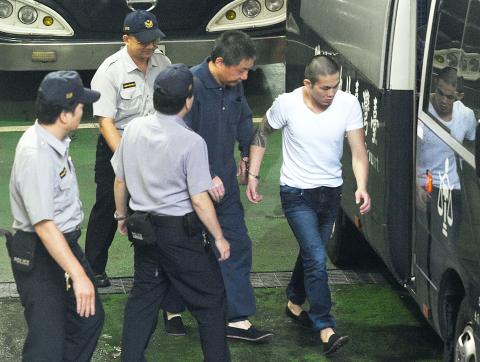The Taipei District Court yesterday sentenced Chinese intelligence officer Zhen Xiaojiang (鎮小江), who recruited Taiwanese military personnel as part of a spy ring, to four years in jail for violations of the National Security Act (國家安全法).
Five other people, all Taiwanese military officers, who were also found guilty in yesterday’s ruling, were given more lenient sentences.
The court gave retired army major-general Hsu Nai-chuan (許乃權) a three-year jail term, while retired air force colonel Chou Chih-li (周自立) received a suspended 18-month sentence with five years of probation; retired army officer Yang Jung-hua (楊榮華) a suspended five-month term with two years of probation; retired air force pilot Sung Chia-lu (宋嘉祿) a suspended 12-month sentence with four years of probation; and retired air force pilot Ma Po-le (馬伯樂) a suspended four-month term with two years of probation.

Photo: Lo Pei-der, Taipei Times
According to the ruling, the sentences for all except Hsu and Chou can be commuted to fines.
Yang, Sung and Ma will not be required to serve time in prison due to their suspended sentences.
The trial was held in chambers and was closed to the media due to the sensitive nature of military and state security information and materials being discussed in the case.
The judge said Zhen succeeded in recruiting a significant number of Taiwanese military personnel to work for China, and inflicted major damage to national security and the operations of the armed forces.
Zhen, who retired from the Chinese People’s Liberation Army (PLA) at the rank of captain, was last year apprehended by authorities for operating what was said to be the largest Chinese spy ring in Taiwan in years.
Reports said Zhen joined the Chinese Ministry of State Security after retiring from the PLA, obtained Hong Kong residency in 2005 and then traveled to Taiwan numerous times on business and tourist visas.
During his visits, Zhen recruited Taiwanese military personnel by offering financial rewards and other inducements, asking them for classified information on the nation’s radar stations, key defense installations and intelligence on US-sourced advanced aircraft and other weapons systems.
A judicial investigation found that Zhen’s spy ring gathered and passed on to China classified information on the Dassault Mirage 2000 fighter jet, the ultra-high-frequency radar installation on Leshan (樂山) in Hsinchu County and other weapons platforms.

ENDEAVOR MANTA: The ship is programmed to automatically return to its designated home port and would self-destruct if seized by another party The Endeavor Manta, Taiwan’s first military-specification uncrewed surface vehicle (USV) tailor-made to operate in the Taiwan Strait in a bid to bolster the nation’s asymmetric combat capabilities made its first appearance at Kaohsiung’s Singda Harbor yesterday. Taking inspiration from Ukraine’s navy, which is using USVs to force Russia’s Black Sea fleet to take shelter within its own ports, CSBC Taiwan (台灣國際造船) established a research and development unit on USVs last year, CSBC chairman Huang Cheng-hung (黃正弘) said. With the exception of the satellite guidance system and the outboard motors — which were purchased from foreign companies that were not affiliated with Chinese-funded

PERMIT REVOKED: The influencer at a news conference said the National Immigration Agency was infringing on human rights and persecuting Chinese spouses Chinese influencer “Yaya in Taiwan” (亞亞在台灣) yesterday evening voluntarily left Taiwan, despite saying yesterday morning that she had “no intention” of leaving after her residence permit was revoked over her comments on Taiwan being “unified” with China by military force. The Ministry of the Interior yesterday had said that it could forcibly deport the influencer at midnight, but was considering taking a more flexible approach and beginning procedures this morning. The influencer, whose given name is Liu Zhenya (劉振亞), departed on a 8:45pm flight from Taipei International Airport (Songshan airport) to Fuzhou, China. Liu held a news conference at the airport at 7pm,

Taiwan was ranked the fourth-safest country in the world with a score of 82.9, trailing only Andorra, the United Arab Emirates and Qatar in Numbeo’s Safety Index by Country report. Taiwan’s score improved by 0.1 points compared with last year’s mid-year report, which had Taiwan fourth with a score of 82.8. However, both scores were lower than in last year’s first review, when Taiwan scored 83.3, and are a long way from when Taiwan was named the second-safest country in the world in 2021, scoring 84.8. Taiwan ranked higher than Singapore in ninth with a score of 77.4 and Japan in 10th with

GRIDLOCK: The National Fire Agency’s Special Search and Rescue team is on standby to travel to the countries to help out with the rescue effort A powerful earthquake rocked Myanmar and neighboring Thailand yesterday, killing at least three people in Bangkok and burying dozens when a high-rise building under construction collapsed. Footage shared on social media from Myanmar’s second-largest city showed widespread destruction, raising fears that many were trapped under the rubble or killed. The magnitude 7.7 earthquake, with an epicenter near Mandalay in Myanmar, struck at midday and was followed by a strong magnitude 6.4 aftershock. The extent of death, injury and destruction — especially in Myanmar, which is embroiled in a civil war and where information is tightly controlled at the best of times —